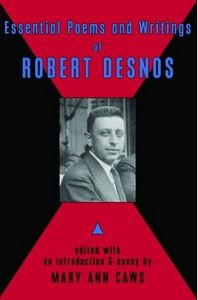Robert Desnos (July 4, 1900-June 8, 1945), was a French surrealist poet who played a key role in the surrealistic movement of his day.
He was interested in "the destiny of mankind" and his work often reflected the violent or erotic images he saw during his experiences in World War I and the Spanish Civil War. He was awarded France's Grand Prix National des Arts in 1955
During the Nazi occupation Desnos worked as an editor for the clandestine publishing house
Les Éditions du Minuit. In addition, he continued to publish poems of his own with other
publishing houses, using various pseudonyms. The day after a film based on one of his scenarios,
Bonsoir Mesdames, bonsoir Monsieurs, was premiered, the poet was arrested. Deported first to
Buchenwald; and then, as Allied forces approached, force-marched to the Terezine
concentration camp in Czechoslovakia, he died of typhus in 1945--just a few days after that
camp's liberation.
In the 60 years since his death, the great French surrealist poet Robert Desnos has become one of the most accomplished lyricists of the 20th century. His name has become synonymous with artistic, personal, and political freedom. He was the last of the Romantics, and the most passionate.
During World War II, Desnos was an active member of the French Résistance, often publishing under pseudonyms, and was arrested by the Gestapo on February 22, 1944. He was first deported to the Nazi German concentration camps of Auschwitz in occupied Poland, then Buchenwald, Flossenburg in Germany and finally to Térézin (Theresienstadt) in occupied Czechoslovakia in 1945, where he died from typhoid, only weeks after the camp’s liberation. He wrote poems during his imprisonment which were accidentally destroyed following his death.
